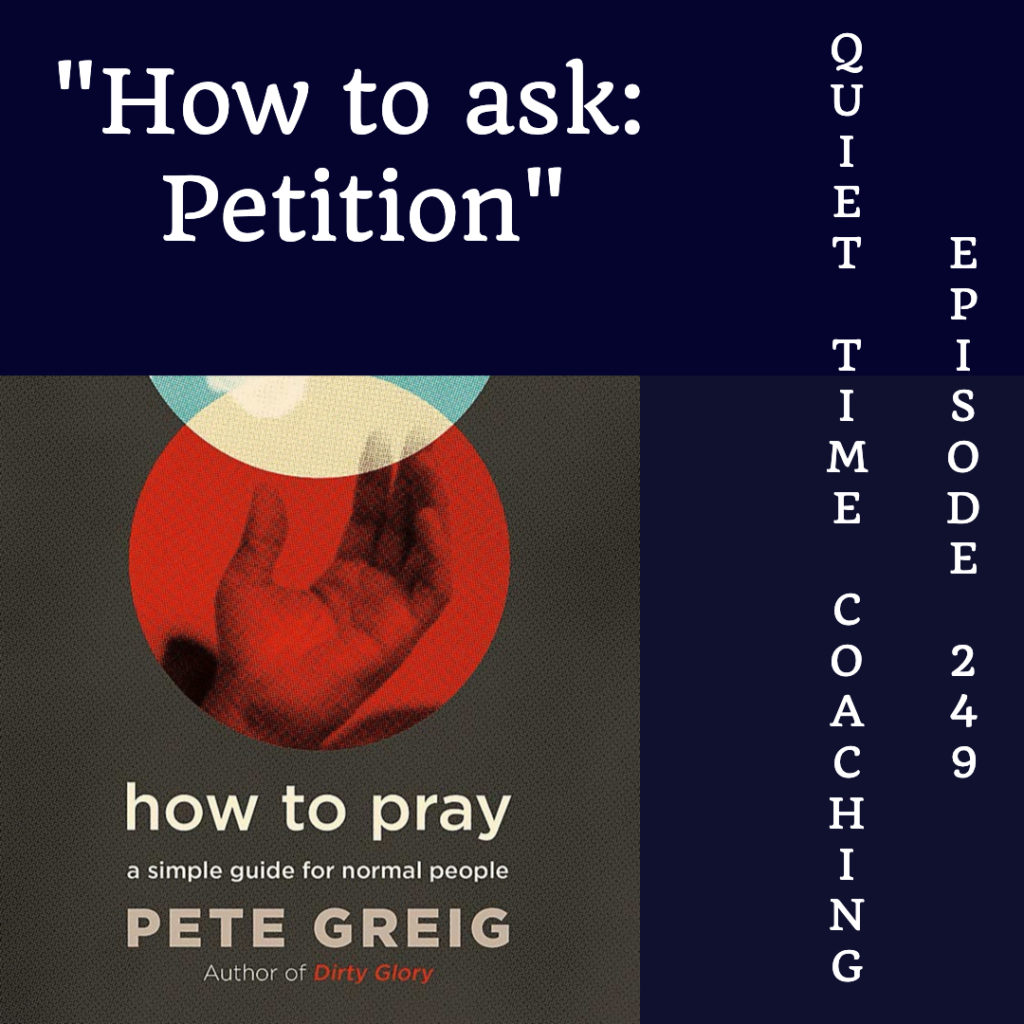Quiet Time Coaching Episode 249

- I am in my third year of participating in the Renovare book club. The first book in this season’s set of four is “How to pray” by Pete Greig.
- Quiet time coaching episodes will focus on his book for the next few weeks. You don’t need to read it to benefit from these recordings, but you might like to get hold of a copy for yourself. I have finished the book and can thoroughly recommend it. A full review of the book will come at a later date in “What we are reading”.

- Today we will reflect on the fifth chapter of the book, “Petition: How to Ask God”. Theme scripture: “‘Give us today our daily bread.’” (Matthew 6:11 NIV11)
- Last week we explored adoration. If that ought to be the easiest thing to do in our times of quiet with God, perhaps the most common thing is to ask. The question is, are we asking with the right motives and what are we expecting?
- There is more than one kind of asking. In particular, we will look at asking for our own needs, and then asking for the needs of others. The latter requests will come in next weeks recording. This week we will discuss requests made to God for what we need.
- With these thoughts in mind, let’s turn to some suggestions from the book to help us petition our Father God.
1. The law of asking
- We do a lot of asking in our lives. And there is nothing wrong with that. It’s healthy to carry a natural sense of asking into our times of prayer. In fact the word prayer comes from the Middle English word meaning ‘to ask earnestly’. The Lord’s prayer contains several requests: ‘Give us … Forgive us … Lead us … Deliver us.’
- Jesus said: “You may ask me for anything in my name, and I will do it.” (John 14:14 NIV11), and “Ask and it will be given to you; seek and you will find; knock and the door will be opened to you.” (Luke 11:9 NIV11) and James wrote, “You do not have because you do not ask God.” (James 4:2 NIV11)
- Why do we take our requests to God? Because he is able to do, here and now in our material world, all the things that we cannot. We might call those things “miracles” or, more precisely simply, answered prayer. Nevertheless, they are acts of God responding to our requests. “Miracle is just a word we use for the things The Powers have deluded us into thinking that God is unable to do. (Walter Wink)”, Greig, Pete. How to Pray: A Simple Guide for Normal People (p. 74). John Murray Press. Kindle Edition.
2. Why we need to ask
- If God knows everything, including the inclinations of our hearts, why do we even need to ask? It’s a fair question. Pete Greig references blind Bartimaeus in Luke 18. Why did Jesus ask him what he wanted when it was blindingly obvious (forgive the pun). “God asks us to ask for at least three reasons. First, because the act of asking is relational in a way that mere wishing is not….The second reason that asking is necessary is that it is vulnerable….Third, asking is intentional. It involves the activation of our wills.” Greig, Pete. How to Pray: A Simple Guide for Normal People (p. 78). John Murray Press. Kindle Edition.
- We ask because it’s part of a relationship.
3. Freewill and God’s will
- How does our will fit with God’s?
“Blaise Pascal said that ‘God has instituted prayer to impart to his creatures the dignity of causality.’ We are God’s partners in the great project of creation,…”
“We tend to expect the King of kings to be a Great Dictator (and might even prefer him to rule in such a manner), but in fact he is a Great Delegator whose divine nature is not to dominate, subjugate and control, but to serve, listen and empower.” Greig, Pete. How to Pray: A Simple Guide for Normal People (p. 78). John Murray Press. Kindle Edition.
- While God does not give us a formula for how to get our prayers answered, and we cannot manipulate him, we do appear to be in a position to influence him and events. What an awesome responsibility then it is to pray!
4. Praying in the name of Jesus
- We are called to pray in the name of Jesus. Praying in his name gives us confidence that our prayers will be heard and answered. But what kind of prayer is it to pray in the name of Jesus?
“To pray in the name of Jesus means asking for things that are consistent with his character and aligned with his purpose….Praying in the name of Jesus means wanting what God wants, aligning our wills with his will, our words with his word, and our personal preferences with his eternal and universal purposes.” Greig, Pete. How to Pray: A Simple Guide for Normal People (p. 79). John Murray Press. Kindle Edition.
- Perhaps, more than anything, praying in the name of Jesus is a reminder of the privilege we have of access to the Father through our friend, brother and saviour.
5. Praying in faith
- True faith is not having faith in faith, or faith in the faithfulness of our prayers, but faith in the person of Christ and a lifestyle of practicing trust in Jesus.
“Hudson Taylor, the great apostle to China, said that ‘the issue is not greater faith, but faith in a great God’.” Greig, Pete. How to Pray: A Simple Guide for Normal People (p. 81). John Murray Press. Kindle Edition.
- How do we grow in this kind of faith? Pete Greig suggests several things including: Celebrating the small things that God does; writing down answered prayers; studying the promises of God in scripture; spending time around spiritually inspired fellow believers – and doing so regularly.
“Faith is God’s gift to us, faithfulness is ours to him.” Greig, Pete. How to Pray: A Simple Guide for Normal People (p. 82). John Murray Press. Kindle Edition.
Conclusion
- Perseverance in prayer is the least inspiring aspect of asking. Persistent, persevering petition is the hallmark of a faithful believer. We do not know how or when Jesus will answer our prayers. Some may not be answered in our lifetime. However,
“…Jesus has told us to persevere in prayer, not to abandon our cars at every amber light; to keep revving the engine, faithfully asking until his answer finally comes.” Greig, Pete. How to Pray: A Simple Guide for Normal People (p. 83). John Murray Press. Kindle Edition.
- Questions for discussion:
- What stands out to you about petition?
- How might your prayer life grow if you could learn how to petition with faith?
- Suggestion: Make petition a part of your daily prayers
- Resources mentioned in the book:
- PRAYER TOOLS: 1. Palms up, Palms Down. 2. How to Maintain a Prayer List. 3. How to Pray the Promises of God (prayercourse.org).
- FUTHER READING: J. Hudson Taylor: A Man in Christ, by Roger Steer.
- Please add your comments on this week’s topic. We learn best when we learn in community.
- Do you have a question about teaching the Bible? Is it theological, technical, practical? Send me your questions or suggestions. Here’s the email: malcolm@malcolmcox.org.
- If you’d like a copy of my free eBook on spiritual disciplines, “How God grows His people”, sign up at my website: http://www.malcolmcox.org.
- Please pass the link on, subscribe, leave a review.
- “Worship the LORD with gladness; come before him with joyful songs.” (Psalms 100:2 NIV11)
- God bless, Malcolm
- PS: You might also be interested in my book: “An elephant’s swimming pool”, a devotional look at the Gospel of John

